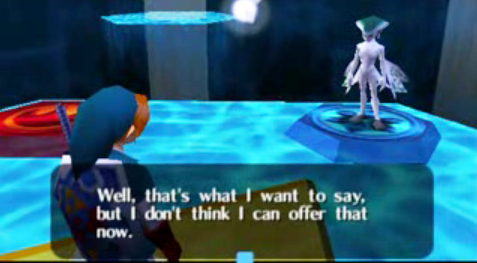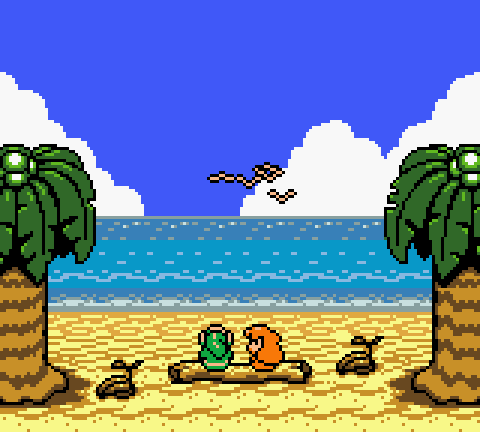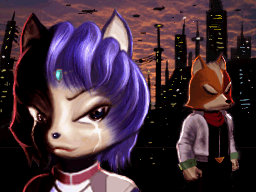
While Mario’s no stranger to Princess Peach, and Link fights off evil for Princess Zelda all the time, Nintendo’s characters just don’t seem to catch a break. At least, not romantically. It’s a rare sight to see even the most innocent smooch in a Nintendo game, much less anything risqué– but aside from the occasional (or not-so-occasional) fan letter to Nintendo Power, it doesn’t seem like Nintendo fans even notice just how sterile Nintendo’s games are. On the other hand, maybe it doesn’t even matter– Nintendo seems to be doing pretty well in spite of everything.
 For a company that developed the Love Tester, a pre-gaming device that purportedly told the level of attraction between two people, Nintendo has never seemed particularly interested in such trivial emotions. In the early entries of the Super Mario series, Princess Peach is relegated almost to MacGuffin status, portrayed as a Scott Pilgrim vs. the World-esque prize to be won after trekking through endless grasslands, oceans and Dry Bones-filled castles. (Thankfully, the Scott Pilgrim comics were less objectifying than the movie counterpart.) And though Donkey Kong for the arcade is normally lauded as one of the first games to feature even the most skeletal of stories, the focus is not so much on Jumpman or Pauline as it is on Donkey Kong, whose alternately grotesque and joyous facial features evoked far more than the relentlessly emotionless Pac-Man could. In both these cases, love is neither the question nor the answer– it’s really just a matter of going through some tedium to get to the prize. (Though it’s still not nearly as bad as Double Dragon, which culminates in a fight between Player I and Player II for the right– the right!– to damsel-in-distress Marian.)
For a company that developed the Love Tester, a pre-gaming device that purportedly told the level of attraction between two people, Nintendo has never seemed particularly interested in such trivial emotions. In the early entries of the Super Mario series, Princess Peach is relegated almost to MacGuffin status, portrayed as a Scott Pilgrim vs. the World-esque prize to be won after trekking through endless grasslands, oceans and Dry Bones-filled castles. (Thankfully, the Scott Pilgrim comics were less objectifying than the movie counterpart.) And though Donkey Kong for the arcade is normally lauded as one of the first games to feature even the most skeletal of stories, the focus is not so much on Jumpman or Pauline as it is on Donkey Kong, whose alternately grotesque and joyous facial features evoked far more than the relentlessly emotionless Pac-Man could. In both these cases, love is neither the question nor the answer– it’s really just a matter of going through some tedium to get to the prize. (Though it’s still not nearly as bad as Double Dragon, which culminates in a fight between Player I and Player II for the right– the right!– to damsel-in-distress Marian.)
But this is not an article about the right of princesses to choose their own destiny, nor is it one about the flagrant derailment of the general female presence in video games. It’s one about how Nintendo characters, despite the chances they are clearly allotted, constantly have the carpet swept from underneath them when it comes to love. Mario gets called out for cake and discovers it’s a lie (far before the whole of geekdom finds out about it), and after a series of fortunate events ends up with a kiss on the nose. Though Mario’s courted, sort of, by the voluptuous Madame Flurrie in Paper Mario: The Thousand Year Door, this is mostly played up for laughs (which, considering society frowns upon necrophilia, is probably for the best). Finally, when asked about the whole thing in Super Paper Mario, Luigi says it’s “kinda hard to say” but that he “wouldn’t call her his girlfriend”– despite Mario coming with Peach to tropical vacations and basketball/golf/tennis/etc. games and the like. Certainly, Peach effectively outgrows her MacGuffin persona, but there’s no love other than platonic love here. At least, not that other people can tell. Mario, being mute, is ineffable.
 On the other hand, in The Legend of Zelda: Ocarina of Time, our friend the Hero of Time constantly runs into situations that involve nubile women who may or may not like him an enormous amount. Though she doesn’t show it outwardly, Malon seems to enjoy hanging out with Link so much that she gives him her horse (though that could be more a case of wanting happiness for the horse), and Ruto both clearly and nonchalantly establishes that, yes, despite their racial differences, she would love to have Link as a husband. And of course, fans love to analyze those fleeting seconds wherein Saria gives Link her Fairy Ocarina, and then looks at him sadly as he runs away from home. But once seven years pass, Malon’s interaction with Link is limited, and Ruto and Saria both send themselves into the Sacred Realm for sagely duties after only fleeting discussion with the Hero. For her part, Saria seems to have given the impression to Mido that she “really…liked…[Link]”, to the point of making Mido promise that he would tell Link she waited for him. Straight out of some cheesy shōjo anime? Perhaps. But it’s still more than Super Mario ever evokes.
On the other hand, in The Legend of Zelda: Ocarina of Time, our friend the Hero of Time constantly runs into situations that involve nubile women who may or may not like him an enormous amount. Though she doesn’t show it outwardly, Malon seems to enjoy hanging out with Link so much that she gives him her horse (though that could be more a case of wanting happiness for the horse), and Ruto both clearly and nonchalantly establishes that, yes, despite their racial differences, she would love to have Link as a husband. And of course, fans love to analyze those fleeting seconds wherein Saria gives Link her Fairy Ocarina, and then looks at him sadly as he runs away from home. But once seven years pass, Malon’s interaction with Link is limited, and Ruto and Saria both send themselves into the Sacred Realm for sagely duties after only fleeting discussion with the Hero. For her part, Saria seems to have given the impression to Mido that she “really…liked…[Link]”, to the point of making Mido promise that he would tell Link she waited for him. Straight out of some cheesy shōjo anime? Perhaps. But it’s still more than Super Mario ever evokes.
Meanwhile, in Link’s Awakening, the only character Link ever talks to on a constant basis (other than the Owl) is Marin, a girl who (eighteen-year-old spoiler alert) disappears along with her entire homeland when Link, well, awakens from his extremely long dream. In fact, the entire story, conceived by newly minted artist Yoshiaki Koizumi, owes a lot to Romantic archetypes that until Link’s Awakening didn’t have much of a place in Nintendo games. (Nintendo CEO Satoru Iwata as well as Shigeru Miyamoto have mentioned a few times, in fact, that Koizumi’s wildly different story single-handedly shifted the focus of the Zelda franchise to story, as well as gameplay.) And so, Marin spends a lot of time talking to outsider Link. Initially, it seems just like natural curiosity, especially from a girl who has never been anywhere outside the island– but later, even the little children wandering Koholint Island whisper about Marin and Link. Marin pleas to Link to not forget her (“I’ll never forgive you!”), and then after the few minutes it takes for Link to destroy the Nightmare, she disappears forever, with a shot of a fully awake Link presumably reminiscing about his dream.

Little does Link realize he’ll never see Marin again.
Now, the stories of Saria and Marin are some pretty definitive evidence of some kind of romance in The Legend of Zelda, and, looking at the bigger picture, the whole of Videogameland– but on the other hand, there’s not much to compare them with. Mido never really elaborates on what Saria means by her message, and Link, being mute, never elaborates on what he thinks about the whole shebang. Meanwhile, Marin wanders around with Link to the point of becoming, briefly, part of his inventory (“You got Marin! Is this your big chance?”), and, defying all expectations of closure, disappears forever. The end result is Nintendo telling a convoluted tale about love (or friendship, or blood brothers, or something) that not only never really goes anywhere, kind of like the adolescent daydreams twelve-year-old boys might have about Megan Fox, but also is completely unsatisfying. “Sure, we’ll throw you all a bone,” says Nintendo, “but we don’t feel like giving you closure.” Whether this is to generate intense fan speculation or horrible slash fiction, we’ll never know. But one thing is clear: whether it’s because of their “family-friendly” deal or their aversion to remotely non-conservative values, Nintendo doesn’t feel like going there.
But nobody complains that Ocarina of Time or Link’s Awakening are bad games because they don’t tie up romantic loose ends just the way players expect, and even less complain that Super Mario 64 sucks Bowser gonads because Peach doesn’t give Mario more than cake. People do complain, however, about the drastically unrealistic romantic exploits of characters in games like BioWare’s Mass Effect or CD Projekt’s The Witcher— where, apparently, running around with members of the opposite sex for around forty hours and asking them about the skeletons in their closets is grounds for marriage, or at least Extremely Serious Sex. (Sometimes, being a huge jerk to them works, too, which is odd, to say the least.) It’s even more hilarious/horrifying when players, wanting at least a somewhat realistic gameplay experience (outside of the whole sci-fi thing), ignore all romantic options and find their characters getting hitched to some random NPC anyway– in a fashion completely contradictory to the way they’ve been playing for the past hundred hours. In that regard, the games that Nintendo makes seem positively realistic in comparison– even if they lack closure.
 But overall, Nintendo just doesn’t seem very interested in love, even in the video game franchises they like best. (Actually: especially in those franchises.) Sure, there are always outliers, such as Krystal and Fox’s (and Panther’s) incredibly convoluted relationship ever since Star Fox Adventures: Dinosaur Planet— or Tetra’s sudden character derailment in Phantom Hourglass— but these are few and far in between, and more often than not sources of intense argument for fans about whether the series is “losing its direction.” It turns out part of what makes Nintendo the super-successful company it has been for decades is starting a tradition– whether story- or gameplay-based– and sticking to it, until players, too, accept it. Mario won’t be inducted into the royal family anytime soon, and Nintendo will probably never rename The Legend of Zelda into The Legend of Ms. Link, but perhaps we’re all the better for it.
But overall, Nintendo just doesn’t seem very interested in love, even in the video game franchises they like best. (Actually: especially in those franchises.) Sure, there are always outliers, such as Krystal and Fox’s (and Panther’s) incredibly convoluted relationship ever since Star Fox Adventures: Dinosaur Planet— or Tetra’s sudden character derailment in Phantom Hourglass— but these are few and far in between, and more often than not sources of intense argument for fans about whether the series is “losing its direction.” It turns out part of what makes Nintendo the super-successful company it has been for decades is starting a tradition– whether story- or gameplay-based– and sticking to it, until players, too, accept it. Mario won’t be inducted into the royal family anytime soon, and Nintendo will probably never rename The Legend of Zelda into The Legend of Ms. Link, but perhaps we’re all the better for it.




 ShareThis
ShareThis







Yeah I agree, and I hated the end of Zelda: TP. Link just gets finished with saving the world, and instead of spending time with Ilia he gets on Epona and leaves. And while we may not see the actual relationships, we know they happen. Ex- The Golden Wolf in TP called Link his son, so the Wolf could be the Link from Oot and MM, and could have married either Romani or Malon, since TP link works on a ranch.
What are you talking about? There is no “Zelda timeline.” Nintendo said so. Oh wait, then they recently said there was one :) :)
Wow, I definitely missed that Golden Wolf son thing. I should probably check that out. Truth be told, I didn’t give TP more than one playthrough, haha :X
Great article, especially if you’re never played Link’s Awakening. (I course *I* have… I’m talking about my friend… Dave.) A really interesting look into the whole lack of romantic consolidation in Nintendo’s biggest narratives and you’re definitely right that it’s Nintendo’s intent to avoid making these things particularly explicit or final.
Do you think it’s part of a Peter Pan syndrome with Nintendo characters? A desire never to mature and so perpetually retain their youthful innocence. Cos we all know Nintendo is against maturing their franchises in any way.
Adam, I think you should read this article. Or give it to Dave. ;) http://kotaku.com/#!5747784
It seems that Nintendo is just against making anything really concrete in their games, at least, anything other than “congratulations! you’ve beaten the game!”. One could say that this is just fodder for fanfic (though I don’t have an opinion on whether Nintendo likes that kind of thing), but I guess one could also say letting loose ends lie lets Nintendo tie them up themselves … later.
I did forget to mention Kafei and Anju in Majora’s Mask, though still, they’re not exactly protagonists. (Okay, you do play as Kafei briefly, but them’s semantics.) Link’s not the one getting married– he’s just watching, wondering what this whole love thing is about. Shame he’ll never find out.
I have to admit that I’m not much for romance in my games or movies. I’m one of those guys that think’s it’s awesome when Kurt Russell refuses to kiss the girl at the end of “Big Trouble in Little China.” I prefer guns and bombs to roses and candy. I am a happily married guy and I certainly think romance is cool — just not in my entertainment.
Whenever I watch my friend play Mass Effect and he gets to some kind of crazy romance part (and it is indeed crazy), I have to leave the room because I usually just end up laughing at how, exactly, these characters got to that point.